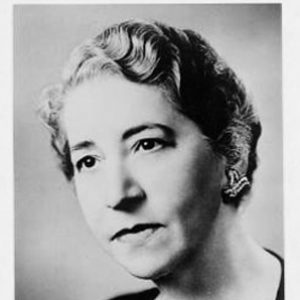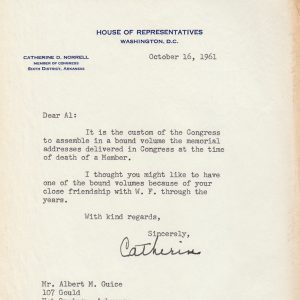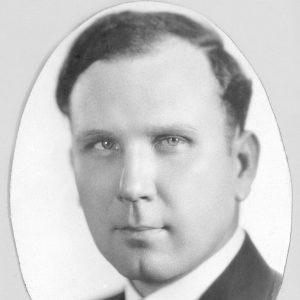calsfoundation@cals.org
Catherine Dorris Norrell (1901–1981)
Catherine Dorris Norrell was the wife of Congressman William Frank Norrell and succeeded him in Congress, becoming the third woman in Arkansas history to serve in the U.S. House of Representatives.
Catherine Dorris was born in Camden (Ouachita County) on March 30, 1901, to Baptist preacher Franklin Dorris and Rose Whitehead Dorris. The family moved from congregation to congregation in Texas, Tennessee, and Arkansas, and Dorris attended public schools in all of those states, finishing high school in Monticello (Drew County). She attended Ouachita Baptist College (now Ouachita Baptist University) in Arkadelphia (Clark County) as well as the University of Arkansas (UA) in Fayetteville (Washington County), becoming an accomplished organist and pianist. Afterward, she taught in the public schools of Monticello. She eventually became director of the music department at Arkansas A&M College, now the University of Arkansas at Monticello (UAM).
She married lawyer William Frank Norrell in 1922, and they had one child.
Her husband was elected to the Arkansas state Senate in 1930 and the U.S. House of Representatives in 1938. Norrell worked for both the state legislative and congressional staff for thirty years as her husband’s legislative assistant. While her husband was in office, Norrell served as president of the Congressional Wives Club and was a close friend of Hattie Wyatt Caraway of Jonesboro (Craighead County), the first woman ever elected to the U.S. Senate from any state.
Norrell’s husband died on February 15, 1961, after having suffered an initial stroke in 1954, and she ran in a special election to replace him. Her daughter Judy, on leave from George Washington University Law School in Washington DC, managed the campaign. Norrell’s slogan was direct: “Keep Your Congressional Power Up! Elect Mrs. W. F. Norrell…the Only Candidate Prepared to Step In.” Norrell faced four Democrats in the campaign, including the top contender, John Harris Jones, a young attorney from Pine Bluff (Jefferson County), who attacked Norrell for attempting to claim two congressional salaries, one as a widow receiving survivor’s compensation and one as a member, were she to be elected. But his efforts to undercut wide sympathy for the widow Norrell were to no avail, and she was elected to the Eighty-seventh Congress on April 18, 1961, prevailing with forty-three percent of the vote versus twenty-five percent for Jones and twenty-three percent for M. C. Lewis. Norrell took the oath of office on April 25, 1961, and received an assignment on the Committee on Post Office and Civil Service.
Norrell concentrated her legislative efforts on economic development for Arkansas and especially for her district. She endeavored to protect the clay, textile, and lumber industries through tariffs and other government controls, as well as supported a bill that eased Internal Revenue Service (IRS) efforts to collect retroactive taxes from businesses in those areas (this passed with assistance of chairman of the Ways and Means Committee, Wilbur D. Mills). Norrell believed that the wood product industry in her district suffered from a reduction in U.S. tariff rates when foreign countries did not reciprocate.
Norrell also used her new prominence to acknowledge the contributions women make to American political life. In May 1961, she sponsored a joint resolution calling for passage of the Equal Rights Amendment, a measure long stalled in the House Judiciary Committee. She secured the support of Congressman Mills for those efforts.
Norrell served until January 3, 1963. She chose not to seek reelection, as Arkansas’s congressional delegation was reduced from six to four representatives on the basis of the 1960 census. Her district was divided between two powerful incumbents, Representative Mills and Representative Oren Harris of El Dorado (Union County), the chairman of the House Committee on Interstate and Foreign Commerce.
President John F. Kennedy appointed Norrell as deputy assistant secretary of state, and she served from 1963 to 1965, at which time President Lyndon B. Johnson appointed her as director of the U.S. Department of State Reception Center in Honolulu, Hawaii. She remained in this position from June 1, 1965, to January 5, 1969. A family story holds that, upon her arrival at the center in Hawaii, reporters reminded Norrell that her husband had voted against Hawaii’s statehood in the 1950s. “But that was my husband and not me,” she replied, adding, “I’m delighted to be here.” Norrell stayed in Hawaii for most of her retirement, working part time as a church musician.
Eventually, Norrell returned to her hometown of Monticello. She died in Warren (Bradley County) on August 26, 1981. She was interred, alongside her husband, in Oakland Cemetery in Monticello.
For additional information:
“Catherine D. Norrell.” Biographical Directory of the United States Congress. http://bioguide.congress.gov/scripts/biodisplay.pl?index=N000136 (accessed February 7, 2022).
Chamberlain, Hope. A Minority of Members: Women in the U.S. Congress. New York: Praeger, 1973. New York: Praeger, 1973.
William F. and Catherine D. Norrell Papers. Special Collections. University of Arkansas Libraries, Fayetteville, Arkansas.
Women in Congress, 1917–1990. Washington DC: Government Printing Office, 1991.
Kay C. Goss
Alexandria, Virginia







Comments
No comments on this entry yet.